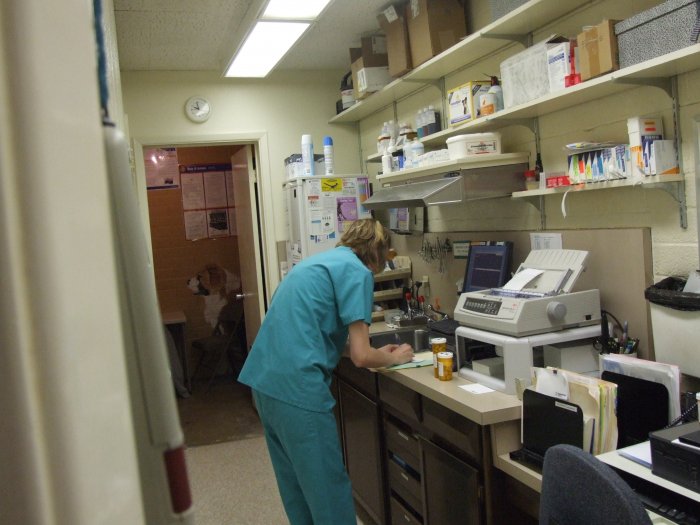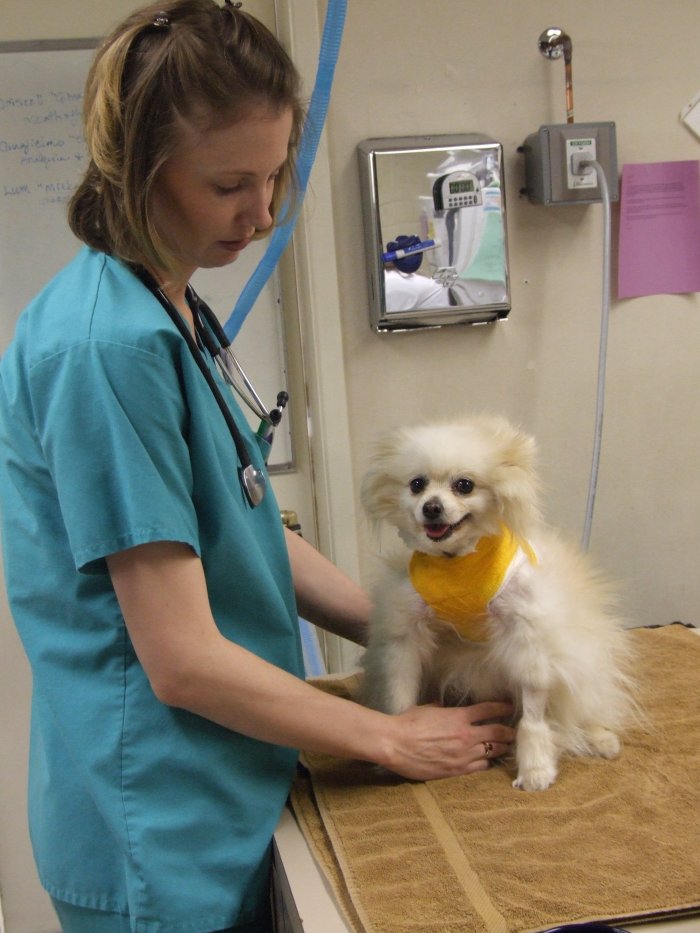We know you’re so excited to go on some autumn nature walks with your dog, but for this #FallSafetyTip, make sure you watch out for snakes, some of which can be venomous! They’re preparing for hibernation and may be a little crankier if disturbed by a curious pet!🐍
When walking or hiking, if something happens to your pet, be sure to contact your veterinarian as soon as possible. #VCApets
’Tis the season of pumpkin spice, warm socks and plaid! Now that it’s fall, we hope you and your pets enjoy colorful walks (and be careful if jumping in leaves)! 🍂🍁#VCApets
True or false: “My cats can’t get ringworm because they never go outside.”
False! Ringworm spores can live on surfaces – furniture, carpet, blankets -- for up to two years. Even worse, many cats don’t show any symptoms at all, although they are contagious to both pets and humans.
Dr. Jessica Lowe of VCA Beacon Hill Cat Hospital explains in today’s Daily Paws article. #vcapets
https://www.dailypaws.com/cats-kittens/health-care/feline-parasites/ringworm-in-cats-what-to-do-and-how-to-avoid-them
DAILYPAWS.COM
How to Know if Your Cat Has Ringworm & What to Do
It’s National Indoor Plant Week! 🌿 Make sure to avoid houseplants that are poisonous for pets, like sago palms.
Sago palms: beautiful, but deadly! Because they contain the toxin cycasin, this can lead to liver failure if eaten. So to be extra safe, it might be a good idea to leave this plant out of your decoration scheme. 🛑🐱🐶
Looking for pet-safe plants? Visit the ASPCA’s guide: bit.ly/32iHASu. If your pet has ingested a toxic plant, call your veterinarian or Animal Poison Control (888-426-4435) right away. #vcapets
ASPCA.ORG
Toxic and Non-Toxic Plants
Happy International Rabbit Day! 🐰
Did you know the following 7 facts about rabbits?
◈ Rabbits need to eat more than carrots, contrary to cartoons! In fact, in the wild, rabbits don’t eat root vegetables—they’d much rather munch on greens like weeds, grasses, and clovers. Carrots are fine to give your rabbit occasionally for treats, but it should be known that carrots are high in sugar and contribute to tooth decay in 11% of domesticated rabbits!
◈ Rabbits come in a variety of sizes, ranging from tiny to extra large! The Flemish giant rabbit (which is the world's largest rabbit breed) can reach 2.5 feet in length and can weigh up to 22 pounds!
◈ A rabbit is ready to start breeding as early as 3-8 months old. Once they reach sexual maturity, they can copulate eight months out of the year, EVERY year, for the REST of their 9-12 year lifespan. Rabbits (like cats) are what are called "induced-ovulators", meaning that their reproductive system doesn't follow cycles, but rather, is triggered by intercourse. Rabbits have a 30-day gestation period, and have average litters between 4-12 kits.
◈ After digesting a meal, rabbits will sometimes eat their own poop and process it a second time. This is an essential part of a rabbit's diet. Rabbits produce a special type of poop, called cecotropes, that are softer than their normal pellets and meant to be eaten. Rabbits have a fast-moving digestive system, and by redigesting waste, they're able to absorb nutrients their bodies missed the first time around.
◈ Rabbits do not have the ability to vomit, as their digestive system is physically incapable of moving in reverse. Eating roughage helps in pushing food/fur through their digestive tract.
◈ Rabbit's teeth never stop growing. A rabbit's diet in the wild includes a lot of gritty, tough-to-chew plant food that would eventually wear down a permanent set of teeth. Their teeth can grow at a rate of up to 5 inches a year. Domestic rabbits who aren't fed abrasive foods must have their teeth filed down to stop the teeth from overgrowing and making it difficult for them to eat.
◈ A rabbit's ears serve two main purposes, one being hearing and the other is to help keep them cool. Rabbits can rotate their ears 270 degrees, allowing them to detect any threats that might be approaching from close to 2 miles away. More surface area means more places for body heat to escape from, therefore helping cool down the rabbit.
https://rabbit.org/
RABBIT.ORG
House Rabbit Society | Buy a Bunny a Little Time
Every month is Pet-Sitter Education Month (even though it's really September), so we’re giving you a helping hand in finding the best pet sitter. 🐶 🐱 💖
Tip 2: Research options. Trusting your pets with someone is no joke, so we say research, research, research! Some of the things to look for when considering candidates are credentials, references and affiliations. There are many pet sitters who work with certified agencies, so they’re a good place to start looking! #vcapets
October is National Pet Wellness Month! So make sure to schedule a routine check-up if it’s been a while ❤️🐶#VCApets
Does your pet sleep in a crazy position? Or maybe use the bathroom like a human? Whatever it is, we want to know your pet’s strangest habit! #VCApets
Every month is Pet-Sitter Education Month (even though it's really September), so we’re giving you a helping hand in finding the best pet sitter. 🐶 🐱 💖
Tip 4: Do a trial run before you commit. So you think you’ve found the perfect pet sitter? That’s great—just remember one important thing to make sure you’re leaving your pets happy and safe! You should always give them the chance to meet the sitter beforehand so you can see how they interact and respond to them. #vcapets
It’s not every day you meet a pug with a full wardrobe — complete with coordinating eye patches — but Ladybug is no ordinary pug!
Learn how she overcame cancer with grace and glamour, thanks to the experts at VCA Northwest Veterinary Specialists.
STORY: bit.ly/ladybug20 #vcavoice
We know you’re so excited to go on some autumn nature walks with your dog, but for this #FallSafetyTip, make sure you watch out for snakes, some of which can be venomous! They’re preparing for hibernation and may be a little crankier if disturbed by a curious pet! 🐍
When walking or hiking, if something happens to your pet, be sure to contact your veterinarian as soon as possible. #VCApets
Visiting your veterinarian regularly for checkups can identify cancer early. Spaying or neutering, and helping your pet maintain a healthy weight can reduce the risk of cancer. #petcancercare
—Veterinary Pet Insurance bit.ly/3bOIcAE
Dogs and cats who are neutered cannot get testicular cancer. #petcancercare
—AVMA bit.ly/2zRhB8Y
Humans and dog have similar cancer biology. Luckily, many treatments that are safe for people have also been proven to be safe and effective for dogs. #petcancercare
—National Cancer Institute bit.ly/36mEzRx
CANCER.GOV
Helping Dogs—and Humans—with Cancer
Exciting news! In our never-ending effort to provide outstanding care for your pet at the most affordable prices, we invite everyone to join CareClub, our affordable monthly wellness plans with UNLIMITED EXAMS!!
CareClub’s made-for-you memberships are designed with your dog and cat in mind. Get what your pet needs when you need it with CareClub!
Now through December 31st, 2020, we're waiving the enrollment fee for any of our affordable VCA CareClub Wellness Plans (a $49 value)! Give us a call at (623) 846-5965 for an additional information or to sign your pet up!
Happy Holidays!
Breeds with light-colored fur, short coats and less hair on the belly are more vulnerable to sunburns and skin cancer. #petcancercare
—Skin Cancer Foundation bit.ly/2Tooqpm
SKINCANCER.ORG
Protect Your Pets From Skin Cancer! - The Skin Cancer Foundation
https://wearethecure.org/learn-more-about-canine-cancer/canine-cancer-library/lymphoma/
Today is National Canine Awareness Lymphoma Day. 💜
Here are 10 Signs that can be early warning signs of cancer in your canine:
1. Sores that do not heal. 2. Abnormal swellings that persist or continue to grow. 3. Loss of appetite 4. Difficulty eating or swallowing 5. Weight Loss 6. Persistent lameness or stiffness 7. Offensive Odor 8. Difficulty breathing, urinating, or defecation 9. Bleeding or discharge from any body opening 10. Hesitation to exercise or loss of stamina
WEARETHECURE.ORG
Lymphoma - The National Canine Cancer Foundation
It’s always a good time to get your pet microchipped—but especially in the winter, when separating from your pet is more dangerous! Here’s why it might be time to schedule an appointment: https://bit.ly/2Xfz977 #vcapets
VCAHOSPITALS.COM
Microchips help pets make their way home
Here’s a question to keep you on your paws! Do you know which breed is currently the most paw-pular in America? 🤔#vcapets
A breed that appeared in America in the late 1800s, the American cocker spaniel quickly became one of the countries’ most popular dogs! That’s probably because they’re known for being happy-go-lucky and great with families. 💕🐶#vcapets
“What greater gift than the love of a cat”—Charles Dickens 💓🐱#vcapets
Is your pet embracing spending more time at home by sporting a serious case of bed head? Show us their bad hair day (we don’t judge! 😂) #vcapets
February is the month of love, and today is Doggy Date Night! So, grab your pet’s food bowl, pour them some chilled water (and maybe a drink for yourself!) and have a cozy dinner together! 💕🐶#vcapets










